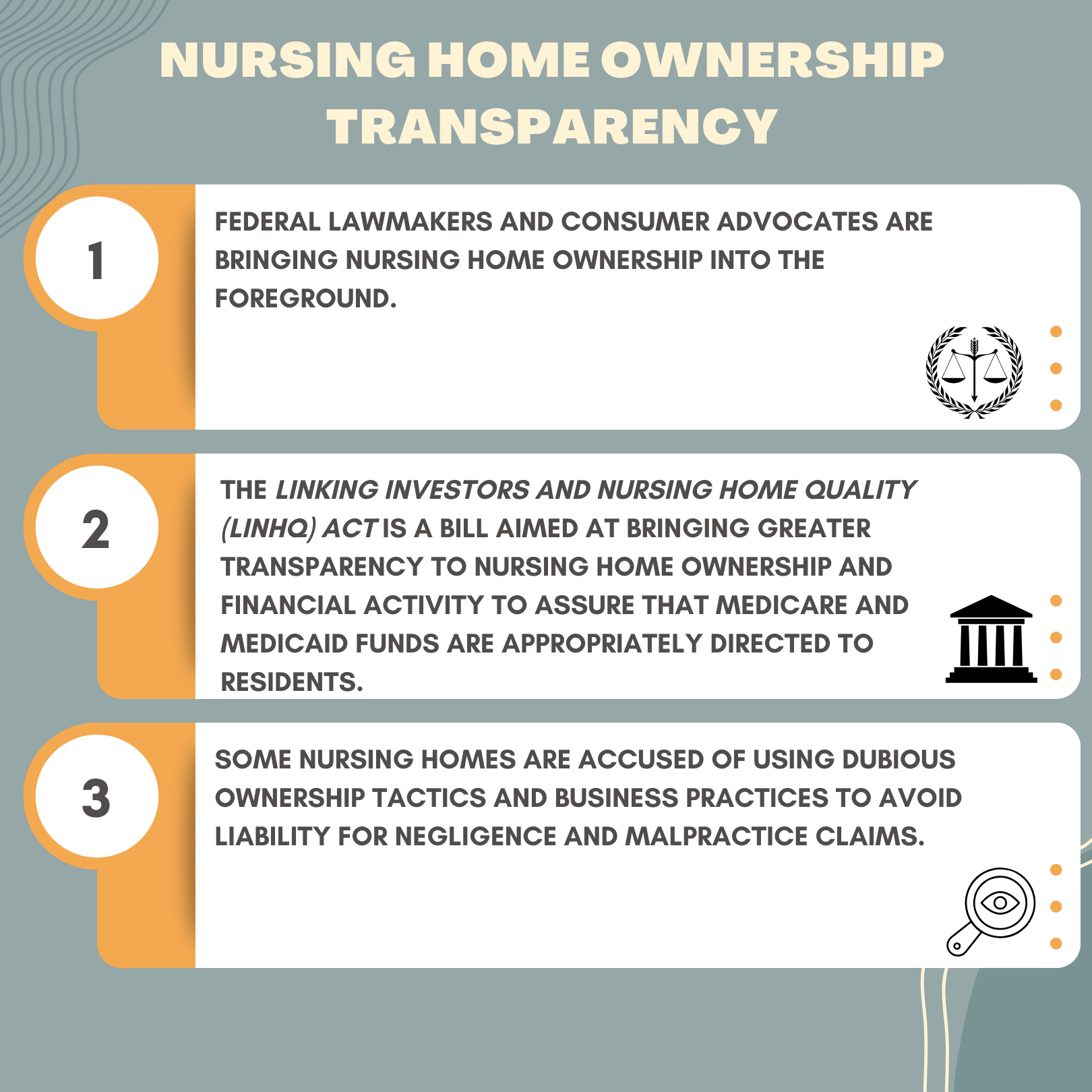 An investigation into the dubious ownership tactics of one of the nation’s largest nursing home chains, Consulate Health Care, has heated up the pressure to bring greater transparency to nursing home ownership and financial dealings. The STAT news investigation trails increasing attention from government agencies, lawmakers, and consumer advocates concerned about nursing home ownership structures and business practices. The investigation alleges that Consulate Health Care used questionable legal maneuvers aimed at evading financial liability for malpractice claims.
An investigation into the dubious ownership tactics of one of the nation’s largest nursing home chains, Consulate Health Care, has heated up the pressure to bring greater transparency to nursing home ownership and financial dealings. The STAT news investigation trails increasing attention from government agencies, lawmakers, and consumer advocates concerned about nursing home ownership structures and business practices. The investigation alleges that Consulate Health Care used questionable legal maneuvers aimed at evading financial liability for malpractice claims.
Federal lawmakers have recently brought questionable nursing home ownership practices into the foreground. The Administrator for the Centers for Medicare and Medicaid Services, Chaquita Brooks-LaSure, has prioritized the goal of nursing home transparency to assure that nursing homes have accountability on how federal dollars are being spent and who can be held accountable for issues. Additionally, Congresswoman Jan Schakowsky (D-IL) and Congressman Mark Takano (D-CA) introduced the Linking Investors and Nursing Home Quality (LINHQ) Act, a bill aimed at bringing greater transparency to nursing home ownership and financial activity to assure that Medicare and Medicaid funds are truly being directed to nursing home residents.
The STAT news investigation asserts that Consulate Health care has developed complex and inter-related corporate governance structures to avoid paying large verdicts to plaintiffs of malpractice lawsuits. Legal tactics, such as filing bankruptcy for six Consulate affiliate organizations, have helped Consulate to lower settlements amounts while ignoring the funds of its larger corporate structure and its private equity owner. Additionally, the company is well-known for maintaining low levels of liability insurance to deter plaintiffs from filing lawsuits, according to Philadelphia nursing home neglect lawyers.
As a result, families whose loved ones have suffered from malpractice have few recourses in their claims against the company. One plaintiff alleges that her brother suffered from severe bed sores, malnutrition, and ultimately passed away due to negligence at Marshall Health and Rehabilitation Center. She is seeking damages for the fatal neglect that she says occurred at the Consulate subsidiary. Due to the bankruptcy filing, her lawyer opines that the claim will be worth only pennies on the dollar of its true value. Because of the bankruptcy order, all legal actions are halted. Plaintiffs must now seek compensation through the bankruptcy court. Those with unresolved legal actions are anticipated recover only 0.7 percent of their claims.
The plaintiff’s lawyer is also pursuing use of the facility’s liability insurance policy for the claim. However, it’s believed that Consulate facilities’ insurance for Florida facilities covers a mere $100,000 per incident, which will barely cover more than legal fees. Philadelphia nursing home neglect lawyers claim that Consulate purposely maintains bare-bones liability insurance to deter malpractice claims.
The STAT investigation uncovered at least 137 plaintiffs spanning multiple states who had sued the six Consulate affiliates prior to their bankruptcy filings. These claims include serious allegations such as negligence, wrongful death, and Medicare fraud. Plaintiffs trying to recoup damages suffered at Consulate have faced a labyrinth of related businesses and subsidiaries that shrouded the company’s assets and profits. This excessively complicated business structure became a central theme during the bankruptcy filings.
A 2011 case involving Medicare and Medicaid fraud from inflated therapy charges at La Vie Rehab resulted in the Consulate filing Chapter 11 bankruptcy in response to a $258 million judgement against them under the False Claims Act. Later, the U.S. Bankruptcy Court in Delaware reduced the judgement to $4.5 million. Attorneys for Consulate Health Care cited this judgement and cried bankruptcy in arguing for lower settlements amounts in over a dozen of personal injury lawsuits against the company.
Many Philadelphia nursing home neglect lawyers believe that the decision to allow Consulate to avoid payment through bankruptcy court set a bad precedent, enabling nursing home owners to avoid legal responsibility by declaring bankruptcy when they are not actually bankrupt. This outcome may induce other nursing home changes who are accused of False Claim Act violations to take a similar approach.
If you have suffered serious injury at a nursing home, take your case to a lawyer who is stays current on nursing home legislation. Not all personal injury lawyers practice regularly in this field, and it’s important to hire a lawyer with industry knowledge. The attorneys at the Wieand Law Firm handle many cases that involve nursing home and assisted living negligence. We understand the complex nursing home ownership organizational structures that can impact your case.
Our goal is complete client satisfaction. To us, you are more than a claim number; we treat you with personal attention and compassion. Call 215-666-7777 to speak directly with an attorney and learn about your legal options.